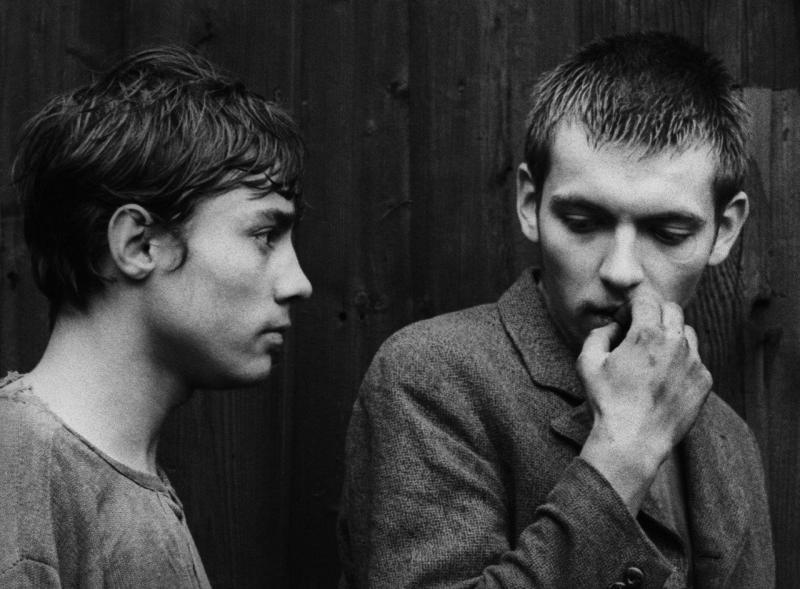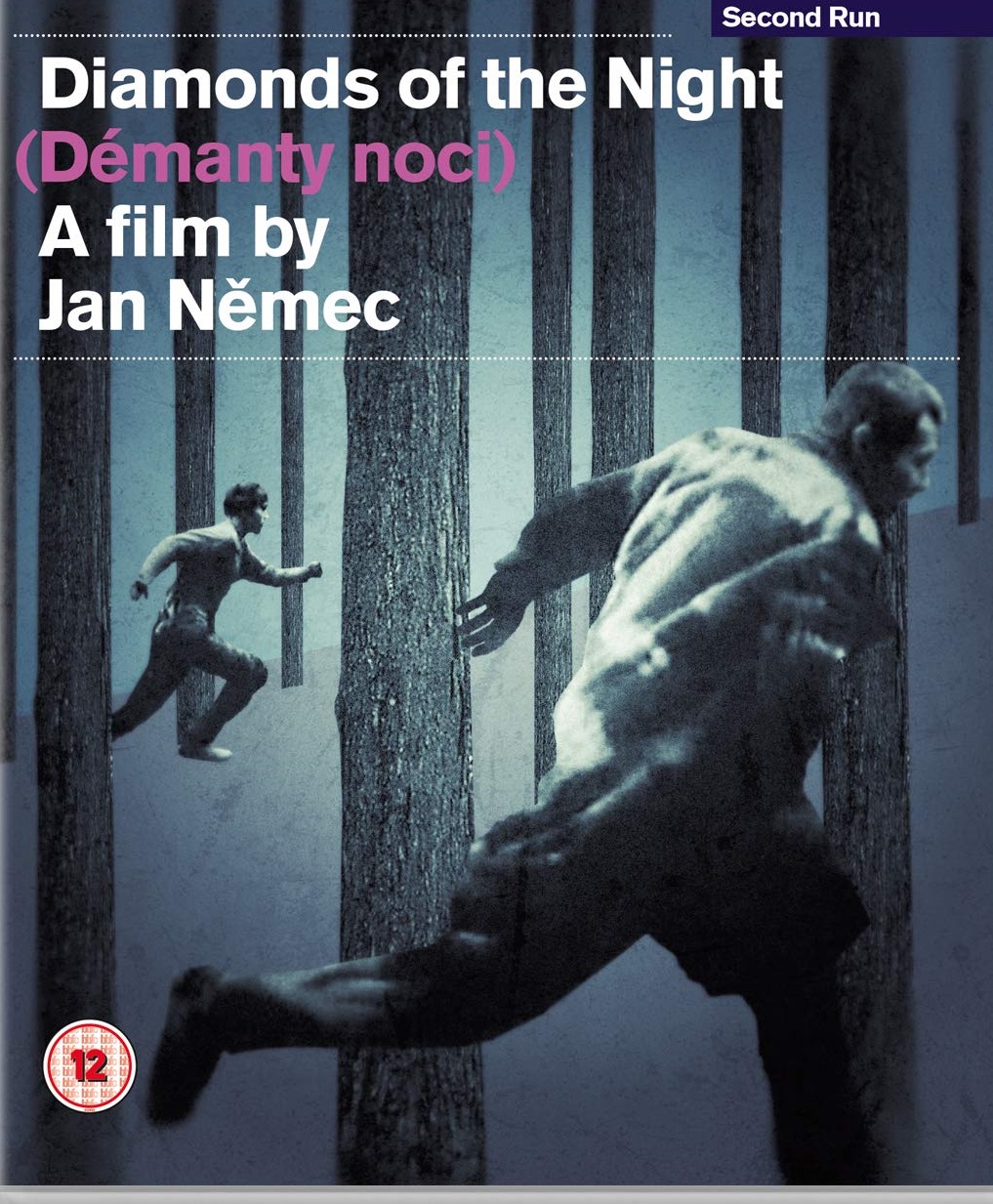Blu-ray: Diamonds of the Night | reviews, news & interviews
Blu-ray: Diamonds of the Night
Blu-ray: Diamonds of the Night
Jan Němec’s existential Czech New Wave thriller is visceral viewing

The opening shot of Jan Němec’s 1964 debut feature, Diamonds of the Night, recalls the start of Orson Welles’s Touch of Evil.
There’s almost no dialogue, and frequent jump cuts take us back to events real and imaginary. Flashbacks show the boys slumped in a moving goods wagon, or travelling through Prague on foot and by tram. Both wear long coats daubed with the letters “KL”, indicating that they’re bound for the camp, though no reference is made to their Jewishness. Played by Ladislav Jánsky and Antonin Kumbera, they’re not even named, having already lost any sense of self. One runs through a decrepit tram carriage towards a pair of officials, the footage deliberately overexposed. The confusion quickly makes complete sense. It’s as if we’re in the boys’ heads: confused, hungry and exhausted to the point of delirium. Němec was a graduate of FAMU, Prague’s famous film school, and knew his stuff: the imaginative use of sound pays homage to Robert Bresson and a wince-inducing shot of one of the boys’ eye sockets covered in ants nods to Bunuel’s Un Chien Andalou.
 There’s a glimpse of a farmer ploughing a field and the woman bringing him food, prompting the boys to follow her to the farmhouse. We next see several versions of what may or may not have played out: the woman is violently attacked, or seduced, or feeds the boys. Presumably the latter, as we later see her staring out at them. After which the two fugitives are captured by a troupe of elderly armed men. The pair crouch against a wall, their toothless captors drinking in celebration. The ending is deliberately inconclusive.
There’s a glimpse of a farmer ploughing a field and the woman bringing him food, prompting the boys to follow her to the farmhouse. We next see several versions of what may or may not have played out: the woman is violently attacked, or seduced, or feeds the boys. Presumably the latter, as we later see her staring out at them. After which the two fugitives are captured by a troupe of elderly armed men. The pair crouch against a wall, their toothless captors drinking in celebration. The ending is deliberately inconclusive.
Diamonds stands up brilliantly 55 years on, a Czech New Wave thriller that’s both artistically challenging and thrillingly dramatic. Lustig was impressed, stating that it was his favourite among adaptations of his novels. Němec enjoyed several years of creative freedom before the Soviet invasion. He left Czechoslovakia in 1974 and pitched up in Hollywood: the bonus appreciation with film historian Peter Hames tells of Němec directing wedding videos as a hack for hire. He assisted director Philip Kaufmann during the making of The Unbearable Lightness of Being and returned to Prague in 1989, working intermittently until his death in 2016.
Presented from the 4K restoration that screened at Cannes last year, this Second Run release, a Blu-ray world premiere, includes Němec’s harrowing debut short film A Loaf of Bread (1960), also based on a story by Lustig. Michael Brooke’s booklet essay and commentary are useful, as is a bonus interview with Lustig’s film director daughter Eva Lustigová.
rating
Share this article
The future of Arts Journalism
You can stop theartsdesk.com closing!
We urgently need financing to survive. Our fundraising drive has thus far raised £49,000 but we need to reach £100,000 or we will be forced to close. Please contribute here: https://gofund.me/c3f6033d
And if you can forward this information to anyone who might assist, we’d be grateful.

Subscribe to theartsdesk.com
Thank you for continuing to read our work on theartsdesk.com. For unlimited access to every article in its entirety, including our archive of more than 15,000 pieces, we're asking for £5 per month or £40 per year. We feel it's a very good deal, and hope you do too.
To take a subscription now simply click here.
And if you're looking for that extra gift for a friend or family member, why not treat them to a theartsdesk.com gift subscription?
more Film
 Beating Hearts review - kiss kiss, slam slam
Romance and clobberings in a so-so French melodrama
Beating Hearts review - kiss kiss, slam slam
Romance and clobberings in a so-so French melodrama
 Materialists review - a misfiring romcom or an undercooked satire?
Writer-director Celine Song's latest can't decide what kind of film it is
Materialists review - a misfiring romcom or an undercooked satire?
Writer-director Celine Song's latest can't decide what kind of film it is
 theartsdesk Q&A: actor Leonie Benesch on playing an overburdened nurse in the Swiss drama 'Late Shift'
The Guildhall-trained German star talks about the enormous pressures placed on nurses and her admiration for British films and TV
theartsdesk Q&A: actor Leonie Benesch on playing an overburdened nurse in the Swiss drama 'Late Shift'
The Guildhall-trained German star talks about the enormous pressures placed on nurses and her admiration for British films and TV
 Freakier Friday review - body-swapping gone ballistic
Lindsay Lohan and Jamie Lee Curtis's comedy sequel jumbles up more than their daughter-mother duo
Freakier Friday review - body-swapping gone ballistic
Lindsay Lohan and Jamie Lee Curtis's comedy sequel jumbles up more than their daughter-mother duo
 Eight Postcards from Utopia review - ads from the era when 1990s Romania embraced capitalism
Radu Jude's documentary is a mad montage of cheesy TV commercials
Eight Postcards from Utopia review - ads from the era when 1990s Romania embraced capitalism
Radu Jude's documentary is a mad montage of cheesy TV commercials
 The Kingdom review - coming of age as the body count rises
A teen belatedly bonds with her mysterious dad in an unflinching Corsican mob drama
The Kingdom review - coming of age as the body count rises
A teen belatedly bonds with her mysterious dad in an unflinching Corsican mob drama
 Weapons review - suffer the children
'Barbarian' follow-up hiply riffs on ancient fears
Weapons review - suffer the children
'Barbarian' follow-up hiply riffs on ancient fears
 theartsdesk Q&A: filmmaker Dag Johan Haugerud on sex, love, and confusion in the modern world
The writer-director discusses first-love agony and ecstasy in 'Dreams', the opening UK installment of his 'Oslo Stories' trilogy
theartsdesk Q&A: filmmaker Dag Johan Haugerud on sex, love, and confusion in the modern world
The writer-director discusses first-love agony and ecstasy in 'Dreams', the opening UK installment of his 'Oslo Stories' trilogy
 Oslo Stories Trilogy: Dreams review - love lessons
First love's bliss begins a utopian city symphony
Oslo Stories Trilogy: Dreams review - love lessons
First love's bliss begins a utopian city symphony
 Blu-ray: Two Way Stretch / Heavens Above!
'Peak Sellers': two gems from a great comic actor in his prime
Blu-ray: Two Way Stretch / Heavens Above!
'Peak Sellers': two gems from a great comic actor in his prime
 Late Shift review - life and death in an understaffed Swiss hospital
Petra Volpe directs Leonie Benesch in a compelling medical drama
Late Shift review - life and death in an understaffed Swiss hospital
Petra Volpe directs Leonie Benesch in a compelling medical drama
 The Naked Gun review - farce, slapstick and crass stupidity
Pamela Anderson and Liam Neeson put a retro spin on the Police Squad files
The Naked Gun review - farce, slapstick and crass stupidity
Pamela Anderson and Liam Neeson put a retro spin on the Police Squad files

Add comment